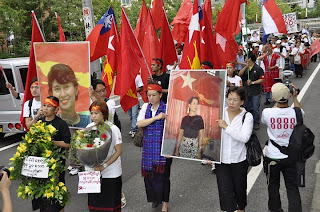[postlink]
https://burmacampaignjapanteam.blogspot.com/2010/09/myanmar-refugees-arrive-in-japan.html
[/postlink]
The ethnic Karen people in three families are the first group to take advantage of the Japanese government’s 2008 decision to accept about 90 refugees over three years as a pilot program, a move that Tokyo says makes it the first Asian country to start such an initiative.
The refugees, who have lived more than 10 years in Mera refugee camp in northwestern Thailand near the border with Myanmar, will aim to learn the Japanese language and find employment to resettle in Japan.
Japan decided to implement the program, promoted by the U.N. High Commissioner for Refugees, in 2008 as a way to contribute to international humanitarian assistance. It would consider accepting more refugees under the program if the first group resettles successfully.
Camp Mera, the biggest refugee camp in Thailand, is home to about 50,000 refugees from Myanmar who fled their country mainly due to armed conflicts between the Myanmar military and Karen National Union rebels.
The 18 refugees underwent a pre-orientation program organized by the International Organization for Migration in July and August in the camp and have learned how to use money and introduce themselves in Japanese.
They will receive more Japanese lessons and job training for six months in Tokyo before deciding where to live and work.
According to an IOM official, most refugees who wish to resettle under the third country program are education-minded and hope that their children can receive education in universities in developed countries such as Japan.
While the refugees’ expectations of Japan are high, one of the difficulties facing refugees from Myanmar, who were mostly subsistence farmers, is finding suitable work.
‘‘Cooperation from the Karen community living in Japan is necessary for the refugees to adapt smoothly in Japan,’’ one expert said, pointing out the enormous gap in circumstances between Japan and Myanmar.
Naoko Hashimoto, a program coordinator at IMO Japan, said, ‘‘The refugees need continuous support in such areas as the language even after the six-month training.’‘
‘‘Each refugee should have his or her own support plan and a caseworker. Also, a system where local people in the refugees’ resettlement places can become their host families is necessary,’’ she said.
TOKYO —
Eighteen refugees from Myanmar arrived in Japan from Thailand, their country of asylum, on Tuesday under the U.N.-promoted third country resettlement program, marking a new phase in Japan’s refugee policy, often labeled too restrictive.The ethnic Karen people in three families are the first group to take advantage of the Japanese government’s 2008 decision to accept about 90 refugees over three years as a pilot program, a move that Tokyo says makes it the first Asian country to start such an initiative.
The refugees, who have lived more than 10 years in Mera refugee camp in northwestern Thailand near the border with Myanmar, will aim to learn the Japanese language and find employment to resettle in Japan.
Japan decided to implement the program, promoted by the U.N. High Commissioner for Refugees, in 2008 as a way to contribute to international humanitarian assistance. It would consider accepting more refugees under the program if the first group resettles successfully.
Camp Mera, the biggest refugee camp in Thailand, is home to about 50,000 refugees from Myanmar who fled their country mainly due to armed conflicts between the Myanmar military and Karen National Union rebels.
The 18 refugees underwent a pre-orientation program organized by the International Organization for Migration in July and August in the camp and have learned how to use money and introduce themselves in Japanese.
They will receive more Japanese lessons and job training for six months in Tokyo before deciding where to live and work.
According to an IOM official, most refugees who wish to resettle under the third country program are education-minded and hope that their children can receive education in universities in developed countries such as Japan.
While the refugees’ expectations of Japan are high, one of the difficulties facing refugees from Myanmar, who were mostly subsistence farmers, is finding suitable work.
‘‘Cooperation from the Karen community living in Japan is necessary for the refugees to adapt smoothly in Japan,’’ one expert said, pointing out the enormous gap in circumstances between Japan and Myanmar.
Naoko Hashimoto, a program coordinator at IMO Japan, said, ‘‘The refugees need continuous support in such areas as the language even after the six-month training.’‘
‘‘Each refugee should have his or her own support plan and a caseworker. Also, a system where local people in the refugees’ resettlement places can become their host families is necessary,’’ she said.
© 2010 Kyodo News. All rights reserved. No reproduction or republication without written permission.






